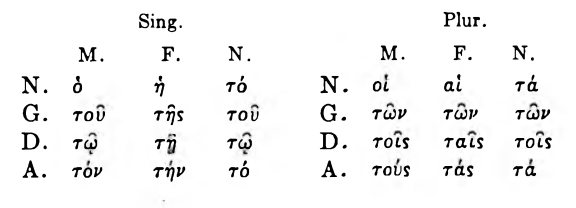
A hundred years ago, when J. Gresham Machen wrote his classic textbook on NT Greek, the best understanding we had of Greek nouns led teachers to give their students 52 charts (called "paradigms"...pronounced like "para-dimes") to memorize.
What William Mounce has done with his "one paradigm and eight rules" is dramatically easier to remember and use.
That said, Machen's book can still be useful as a way of reviewing how the "one paradigm and eight rules" work themselves out in practice.
So here are all of the noun word-formation charts from Machen's textbook. If you wish to download Machen's entire textbook, click here.
The Vocative
These tables will include the vocative case: the case used when addressing somebody directly. I don't spend too much time worrying about the vocative case, since in practice the context makes it very clear when Jesus is, for instance, addressing somebody by name.
Prophet, disciple.
Word, man (or human), son, and slave.
The singular and plural of ruler is:
King.
Father, man.
Hour, truth, glory and writing (or Scripture).
Hope, grace.
City
Hand, woman.
Gift.
Night and flesh.
Name.
Race.
Unlike nouns, which have a specific gender, adjectives can be either masculine, feminine, or neuter.
When used in a sentence, an adjective always agrees with the noun it modifies in case, number (i.e. singular or plural), and gender.
Good.
Small.
Righteous.
Greater.
"True" is an interesting adjective, as it has identical endings for both masculine and feminine.
All.
Much.
Great.
Many numerals do not distinguish between masculine and feminine, or by case. Some do, however.
One.
Three.
Four.
Jesus.
The personal pronoun has no gender in the first person (I) or second person (you). However, it comes in masculine, feminine, and neuter forms in the third person (he, she it).
Myself, yourself.
Himself, herself, itself.
This.
NOTE: This is one word where the presence or absence of an accent can make a difference in the translation of the word.
Who, which what?
Someone, something.
Who, which, what.
Participles start their lives as verbs, but get noun-ish endings. I will deal with them when I build a page discussing verb endings.